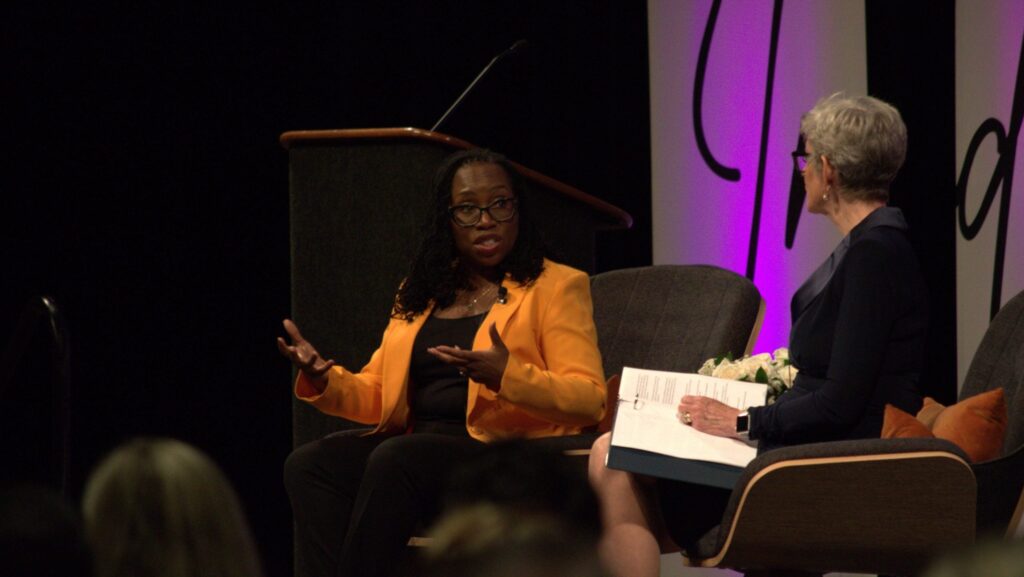Justice Ketanji Brown Jackson speaks in Indy
INDIANAPOLIS (WISH) — Supreme Court Justice Ketanji Brown Jackson on Thursday said the nation’s highest court is not as partisan as its 6-3 conservative majority might indicate.
Jackson’s remarks came at a luncheon sponsored by the Indianapolis Bar Association. In a Q&A session with Jane Magnus-Stinson, senior judge for the U.S. District Court for the Southern District of Indiana, Jackson said the justices’ alignments in rulings vary because the cases do. Jackson said, sometimes, she aligns with certain justices because they think about a particular issue the same way she does. Jackson has aligned with Justice Neil Gorsuch, a Donald Trump appointee, several times over the most recent term.
Much of Thursday’s discussion centered around her life, upbringing, and entry into the judiciary, as described in her 2024 memoir, “Lovely One.” Jackson is the first Black woman to serve on the high court and the first public defender. She said many African-Americans at the time of her birth in 1970 were eager to take advantage of the opportunities afforded to them by the dismantling of Jim Crow laws and her parents, who had grown up in the segregated South, strongly encouraged her to become whatever she wanted to be.
Jackson said she thought about becoming a judge as early as age 11, when she learned she shared a birthday with Constance Baker Motley, the first Black woman to become a federal judge. She said she was also encouraged by Sandra Day O’Connor’s confirmation as the first woman to serve on the Supreme Court.
Jackson said her background as a public defender informed her approach to the bench. She said when she talked to criminal defendants in jail, she found they often did not understand the legal processes to which they had been subjected.
“I think that experience stayed with me as a judge because I decided very early on that I was going to focus on communicating with the defendants that came before me,” Jackson said. “I felt it was so important to treat the people who came before me with respect because it was crucial for their rehabilitation.”
As one of the high court’s three liberal justices, Jackson dissented in numerous rulings during the just-concluded 2024 term, including the ruling dealing with President Donald Trump’s executive order to end birthright citizenship. In that case, the court did not rule on the order itself, but limited the power of courts to strike down future orders. In her dissent, Jackson wrote, “The Court’s decision to permit the Executive to violate the Constitution with respect to anyone who has not yet sued is an existential threat to the rule of law.”
Jackson said the senior concurring or dissenting justice typically decides who writes the majority opinion or the primary dissenting opinion, but she will write her own dissent if she believes she has something to add.
“There are some times when, even after the principal dissent is written, I have a different perspective or a different take on something or this is an issue of particular importance to me for whatever reason, where I will say, ‘Forgive me, Justice (Sonya) Sotomayor, but I have to write on this case,” Jackson said.
Jackson said she strongly encourages anyone interested in the law, and especially in becoming judges, to serve as law clerks, and to join legal aid groups, such as the Neighborhood Defender Service of Harlem. She said she also recommends joining speech and debate clubs, as this will prepare prospective lawyers to argue in front of judges. In addition, Jackson’s one piece of advice she would give her younger self would be to network more. She said putting in the effort to network will help form connections and, more importantly, potential mentors.
About The Author
You may also like
-
Sheridan Historical Society to hold open house for Bud Wright
-
Authorities seek to file terrorism and assault charges against suspect in Walmart knife attack
-
1 dead after vehicle crashes into tree and catches fire in Fort Wayne
-
Old bridge over I-465 on 71st street to be rebuilt
-
US and EU announce a trade framework after Trump holds tariff talks with European official

